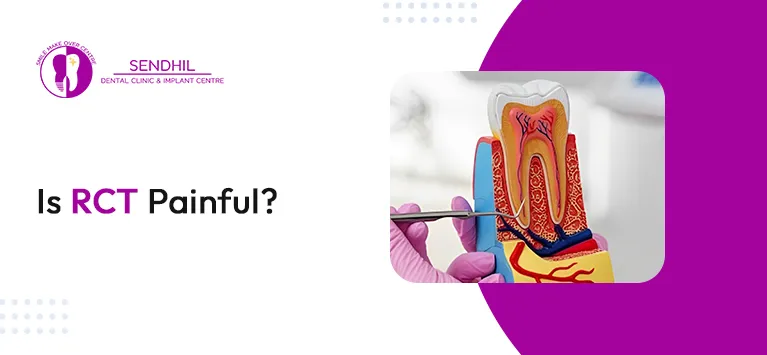
Is RCT Painful?
Do you know what exactly is a root canal treatment, and does it hurt as much as people say? In this blog post, let’s explore what is rootcanal treatment, benefits of having rootcanal and procedures followed during the process. Also, let’s know ṭhe answer for the question ” Is RCT Painful?”.
Table of Contents
What is Root Canal Treatment?
Root canal treatment, also known as endodontic therapy, is a dental procedure used to treat infection or damage within the pulp of a tooth. The tooth’s pulp, which is its innermost layer, is made up of connective tissue, blood vessels, and nerves. When the pulp becomes infected or inflamed due to deep decay, repeated dental procedures, cracks, or trauma, it can cause pain and lead to abscess formation if left untreated.
Benefits of Root Canal Treatment
Here are some of the advantages of having Root Canal Treatment (RCT):
- Relieves severe tooth pain
- Preserves your natural tooth
- Avoids tooth loss
- Prevents infection from spreading
- Enhances the health of jawbone
- Restores tooth function
- Maintains the appearance of your smile
- Protects overall oral health
Procedure in Root Canal Treatment
During a root canal procedure, the dentist or endodontist removes the infected or damaged pulp, cleans and disinfects the inside of the tooth, and then seals it to prevent further infection. Usually, the following steps are included in the procedure:
Anesthesia:
The dentist administers local anesthesia to numb the tooth and surrounding area to ensure the patient feels little to no discomfort during the procedure.
Access Opening:
To gain access to the pulp chamber for root canals, the dentist drills a hole in the tooth’s crown.
Cleaning and Shaping:
Using small instruments, the dentist removes the infected or damaged pulp tissue from the pulp chamber and root canals. After that, the canals are prepared for filling by being cleaned and shaped.
Filling:
Gutta-percha, a biocompatible substance, is used to fill the canals after they have been cleansed and formed. This material seals the canals to prevent bacteria from re-entering and causing further infection.
Sealing:
After the canals are filled, the access opening in the crown of the tooth is sealed with a temporary or permanent filling material to prevent recontamination.
Restoration:
In many cases, a tooth that has undergone root canal treatment will require a restoration, such as a dental crown, to restore its strength, function, and appearance.
Is RCT Painful? : Understanding the Fear
Many people feel terrified when they’re told they might need a root canal treatment (RCT). They form opinions based on what they’ve heard. But what does a root canal feel like? Root canal does it hurt? Well, those toothaches that make you need a root canal can hurt a lot. However, when you actually have the treatment done, the dentist ensures your mouth is numb using a particular numbing medicine. So, while you might feel some pressure or movement, you shouldn’t feel much pain at all during the procedure. That’s why, even though it’s normal to feel nervous, you can trust your dentist to do everything possible to keep you comfortable during the treatment.
Role of Local Anesthesia
Before beginning RCT, the dentist administers local anesthesia to numb the affected tooth and surrounding tissues. Local anesthesia blocks pain signals from reaching the brain, effectively numbing the area and ensuring patients don’t feel pain during the procedure.
Evolving Techniques and Technology
Dentistry has seen significant advancements in techniques and technology, revolutionizing how RCT is performed. Precision instruments and advanced imaging technologies allow dentists to accurately locate and treat the root canal system with greater efficiency, reducing discomfort and improving outcomes for patients.
Conclusion
Rootcanal treatment is a highly successful procedure that can save a tooth from extraction and alleviate pain caused by infection or inflammation of the pulp. It allows patients to retain their natural teeth and continue to enjoy normal biting and chewing functions.
Regarding the question, ‘root canal does it hurt?’ It’s natural to feel some discomfort during or after the procedure, as with any dental treatment. However, this discomfort is typically manageable with the use of local anesthesia and over-the-counter pain medication. Following your dentist’s post-operative care instructions is crucial for ensuring proper healing.





